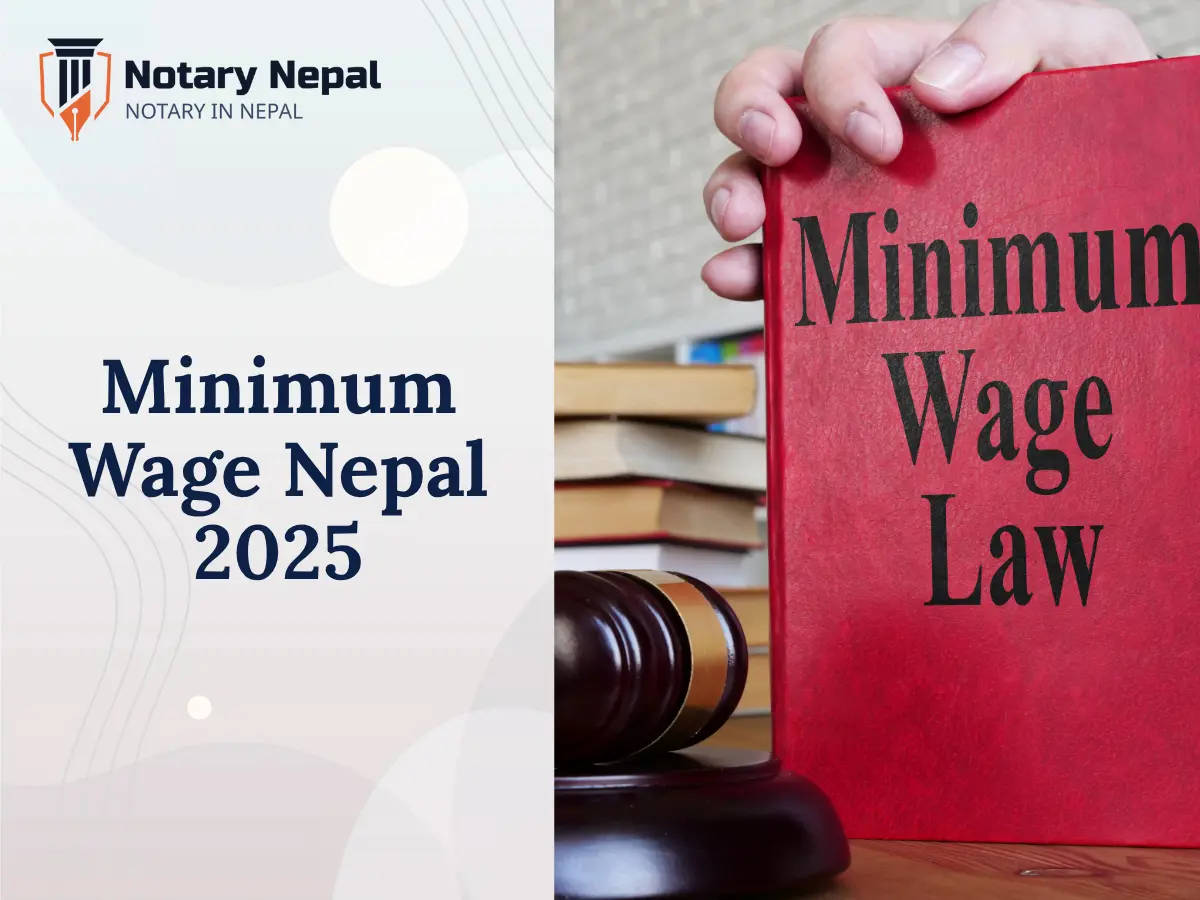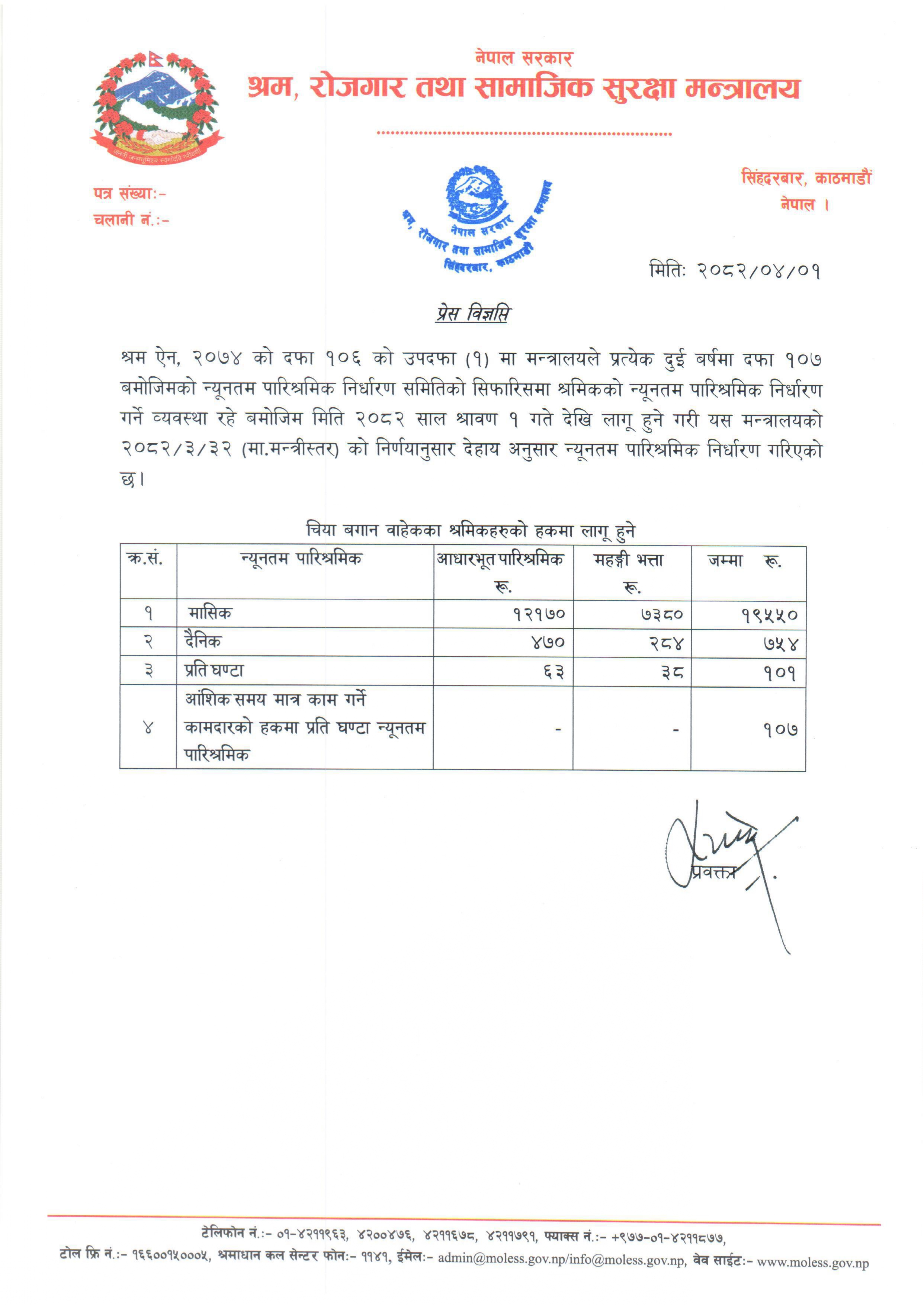

Table of Contents
Kathmandu, July 18, 2025 — The Government of Nepal, together with employer associations and labour unions, has officially raised the minimum monthly wage to Rs 19,550, effective July 17, 2025, marking the first day of the fiscal year 2082/83. This decision follows a tripartite agreement reached during a meeting at the Ministry of Labour, Employment and Social Security, aimed at uplifting worker welfare across Nepal.
This increase reflects the government's commitment to ensuring fair remuneration for workers, in alignment with Nepal’s growing cost of living and international labour standards.
Breakdown of the New Minimum Wage Structure
The Ministry of Labour, Employment and Social Security has published a clear structure for the updated minimum wage, which will be applicable to all sectors except tea estates and gardens.
| Category | Amount (NPR) |
|---|---|
| Monthly Basic Wage | Rs 12,170 |
| Dearness Allowance | Rs 7,380 |
| Total Monthly Wage | Rs 19,550 |
| Daily Basic Wage | Rs 470 |
| Daily Dearness Allowance | Rs 284 |
| Total Daily Wage | Rs 754 |
| Hourly Basic Wage | Rs 63 |
| Hourly Dearness Allowance | Rs 38 |
| Total Hourly Wage | Rs 101 |
| Hourly Wage (Part-Time Workers) | Rs 107 |
This revision reflects a 12.98% increase compared to the previous wage of Rs 17,300 per month, which included Rs 10,820 basic salary and Rs 6,480 dearness allowance.
Wage Law in Nepal: Legal Foundation for Fair Pay
Nepal’s wage regulations are anchored in the Labour Act, 2074 BS (2017 AD), which establishes strong worker protections and mandates fair compensation.
Key Legal Provisions under Labour Act 2074:
Section 107: Mandatory Wage Review
The Labour Act requires the minimum wage to be reviewed every two years, ensuring it keeps pace with inflation and socio-economic conditions.Equal Pay for Equal Work:
It prohibits wage discrimination on any grounds, including gender, caste, or ethnicity.Timely Payment Obligation:
Employers must pay wages within 7 days of the wage period's end.Minimum Wage Committee:
Wages are determined through the Minimum Wage Determination Committee, comprising representatives from the government, employer federations, and trade unions.Coverage:
This minimum wage applies to all sectors, except for specialized sectors like tea plantations, which follow a separate mechanism.
These legal provisions ensure both wage justice and industrial harmony across Nepal.
Stakeholder Reactions to the Wage Increase
Ministerial Perspective
Labour Minister Sharat Singh Bhandari emphasized,
“This agreement reflects our dedication to protecting the dignity of labour. It’s crucial that we now enforce this minimum wage responsibly across all sectors.”
Employer's Perspective
FNCCI President Chandra Prasad Dhakal commented,
“We respect the tripartite consensus. This wage adjustment ensures sustainable labour relations while acknowledging business realities.”
Trade Union Perspective
JTUCC Representative Janak Chaudhary added,
“For the first time, workers' voices have been genuinely included. It’s a monumental achievement for Nepalese workers.”
Historical Growth of Minimum Wages in Nepal
Nepal’s minimum wage has witnessed significant periodic hikes over the years, reflecting growing economic aspirations and inflation adjustments.
| Year | Basic Salary (NPR) | Dearness Allowance (NPR) | Total Minimum Wage (NPR) |
|---|---|---|---|
| 2017 (2074 BS) | Rs 10,000 | Rs 3,450 | Rs 13,450 |
| 2019 (2076 BS) | Rs 10,820 | Rs 6,480 | Rs 17,300 |
| 2025 (2082 BS) | Rs 12,170 | Rs 7,380 | Rs 19,550 |
This upward trend showcases Nepal’s efforts to ensure that wages rise in tandem with living expenses.
Who Will Benefit From This Wage Increase?
The updated minimum wage will directly benefit:
Industrial workers (factories, manufacturing)
Hospitality sector employees (hotels, restaurants)
Construction sector workers
Retail staff
General labourers across formal sectors
Exceptions:
Workers in tea estates and gardens will continue under separate wage guidelines as specified by the Labour Act.
Why Minimum Wage Revision Matters
Advantages for Workers
Better Standard of Living
Higher wages help workers afford basic necessities like food, healthcare, and education.
Boost to Productivity
Well-paid workers are generally more productive, which helps businesses too.
Reduced Exploitation
With clear wage benchmarks, employers cannot legally exploit workers with underpayment.
Positive Business and Economic Impact
Formal Economy Expansion
Higher wages encourage formal employment practices, reducing under-the-table arrangements.
Stronger Industrial Relations
Tripartite consensus reduces labour disputes, fostering stable workplace environments.
Boost to Domestic Consumption
Increased wages mean higher disposable income, which can stimulate local markets.
Potential Challenges and Mitigation
For Businesses:
Cost Pressures on SMEs: Smaller businesses may experience strain due to wage hikes.
Adjustment Period Needed: Businesses must recalibrate operations to absorb wage costs.
Suggested Mitigation:
Government support schemes, such as tax incentives or grants, could ease this transition.
Phased implementation plans for struggling sectors could be an alternative solution.
Monitoring and Enforcement
The Ministry has pledged strict enforcement through:
Labour Office inspections
Complaints portals for workers
Penalties for non-compliance under Labour Act 2074
Trade unions have also committed to grassroots monitoring, ensuring that no worker is deprived of the rightful minimum wage.
International Perspective
Nepal's minimum wage remains modest by international standards, but the latest revision is significant in the South Asian context, bringing Nepal closer to wage parity with neighbouring economies.
Comparative Monthly Minimum Wages (2025):
| Country | Minimum Monthly Wage (NPR Equivalent) |
|---|---|
| Nepal | Rs 19,550 |
| India (Average) | ~Rs 21,000 |
| Bangladesh | ~Rs 14,000 |
| Pakistan | ~Rs 18,500 |
This upward revision enhances Nepal’s competitiveness while ensuring fair labour conditions.
Conclusion: A Progressive Milestone for Labour Rights
The revision of Nepal’s minimum wage to Rs 19,550 per month is a progressive step towards economic justice for workers. It aligns with constitutional rights, Labour Act mandates, and global trends, signaling a more dignified standard of living for the Nepalese workforce.
With collective efforts from the government, employers, and trade unions, Nepal is striving to build a more equitable and prosperous society. Effective implementation and monitoring will be key to ensuring the success of this policy reform.
This article is for informational purposes only and does not constitute legal advice, advertisement, or solicitation. Notary Nepal and its team are not liable for any consequences arising from reliance on this information. For legal advice, please contact us directly.


